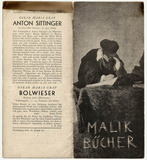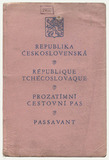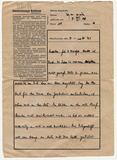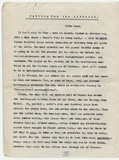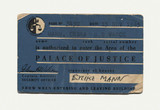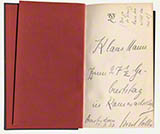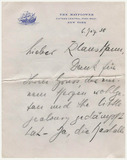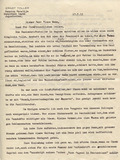Brochure from Malik Verlag presenting the books of Oskar Maria Graf (1937)
In 1936 and 1937 the publisher Malik Verlag published three books by Oskar Maria Graf. Graf had known the publisher Wieland Herzfelde at least since the 1920s when the memoir of his youth Frühzeit (Early Days) and the short stories Zur freundlichen Erinnerung (A Friendly Reminder) were published by his Berlin publishing house Malik Verlag.
Czechoslovakian alien's passport for Oskar Maria Graf (1938)
Oskar Maria Graf was stateless for twenty-four years, from his expatriation from the German Reich on 30 March 1934 until he was conferred American citizenship in 1958. Although he was tolerated in the US and Czechoslovakia, the countries of his exile, he was unable to travel to other countries and could not expect to be let back into these countries after he had left them.
Edgar Weil: Letter to Grete Weil (31 August 1941)
After a failed escape attempt in May 1940, Edgar and Grete Weil had planned to emigrate from Holland in the summer of 1941 with a Cuban tourist visa. While the writer and photographer had her visa already, her husband planned to collect his on 11 June 1941 in Rotterdam.
Erika Mann: Reportage Waiting for the Lifeboat (1940)
At the end of August 1940 Erika Mann travelled via Lisbon to London. She accepted an offer from the British Minister of Information Duff Cooper to work on the BBC's German broadcasts as part of the broadcasting propaganda effort.
Erika Mann: Zehn Millionen Kinder (School for Barbarians), first edition (1938)
At the beginning of 1938 the New York publisher Modern Age Books released Erika Mann's first book in exile, the documentary report, School for Barbarians. The book was a study of methods of upbringing and education under the Nazis.
Erika Mann's identity card as a War Correspondent of the US Army (1944)
On 24 June 1943 Erika Mann received her first ID card from the War Department of the US Army as a news correspondent for the liberal weekly Liberty Magazine (New York) and the Toronto Star Weekly. Thus began a new chapter in her fight against the dictatorship of the Third Reich.
Erika Mann's pass for the international war crimes trials in Nuremberg (1945)
In mid-June 1945, one month after the end of the war, Erika Mann travelled for the last time in her capacity as a war correspondent to Europe. She remained until April 1946.
Ernst Toller: Eine Jugend in Deutschland, first edition (1933)
In the first months of exile, which he spent in the house of the writer Emil Ludwig, Ernst Toller finished his autobiography Eine Jugend in Deutschland. He had worked on the manuscript with interruptions since 1929.
Ernst Toller: Letter to Klaus Mann, 6 March 1938
Ernst Toller’s letter to Klaus Mann from 6 March 1938 comes from the time of his return from California to the American east coast. In Hollywood, in February 1937, Toller had signed a lucrative year-long contract as a scriptwriter with MGM Studios.
Ernst Toller: Letter to Klaus Mann, Dubrovnik, 17 July 1933
On 28 May 1933, eighteen days after the book burnings in Germany, the annual congress of the international PEN Club took place in the Yugoslav town of Dubrovnik (Ragusa). The German PEN members had at this time already been “cleansed”, in the Nazi sense, of Jewish and politically unwelcome writers.
